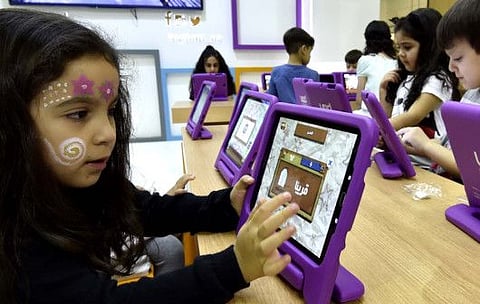Arabic teaching: UAE private schools to adopt Emirati teaching models
Private schools to use more devices and interactive lessons to teach Arabic

Abu Dhabi: The teaching of Arabic, Islamic and Social Studies will soon be standardised across private school across the UAE in a bid to ensure that children grasp the required language and literacy skills, a top education official has said.
The standardisation will ensure that only licensed teachers deliver lessons, and that they focus on teaching students reading, writing, speech, communication and analytical skills, said Hussain Al Hammadi, UAE Minister of Education.
“The Emirati School Model that we’ve implemented at public schools already incorporates these standards. We will now extend these requirements to the teaching of these subjects at private schools as well,” the minister told Gulf News.
The minister was speaking on the sidelines of Qudwa, an annual forum held to discuss current trends and challenges in the education sector. Organised by the Abu Dhabi Crown Prince Court, this year’s two-day event saw the attendance of more than 900 educators and officials.
Global competency
A key area of focus at Qudwa was the teaching of global competency, a set of skills that will allow today’s children to thrive in an increasingly interconnected world. The learning of languages was highlighted as an integral component of being globally competent and competitive.
Arabic is taught as a mandatory subject in the UAE’s private schools, but its teaching has suffered because most teachers still rely on textbooks and rote learning methodologies to deliver content. As a result, few expatriates gain fluency – as a result of classroom learning – in the UAE’s national language solely.
“The implementation of the Emirati School Model of teaching would change this, in my opinion. I’ve been teaching Arabic to high school students for years, and their average scores increased by at least 15 per cent under this new pedagogical method,” said Mohammad Abdulraziq, Arabic teacher at a Sharjah public school.
Emirati School Model
This model of teaching, first introduced in public schools by the UAE Ministry of Education in 2017, makes widespread use of devices in the classroom. According to Abdulraziq, this has made the five-hours-per-week of language learning more exciting for students. Moreover, many lessons are linked with concepts in other subjects, making the teaching more relevant to real life.
“I regularly work with my colleague who teaches Arabic so that students can understand the concepts better. For instance, when we were learning about animals and wildlife in English class, my colleague organised lessons in tandem in Arabic,” said Siham Ibrahim, an English language teacher at a public school.
These new ways of teaching should help make Arabic an easier language to learn for expat students, she added.
Al Hammadi did not, however, specify if the standardisation would mean an increase in the number of hours of instruction dedicated to these subjects at private schools.
Teacher training
This academic year, advanced professional development sessions between January and March 2020 will also focus on upskilling public school teachers in the teaching of Science subjects, Al Hammadi said.
“We mandate 100 hours of professional development for the 22,000 teachers in public schools. Some of these are dedicated to developing the specific pedagogical skills needed by each teacher, and others are spent on enhancing subject-related knowledge,” Al Hammadi explained.
UAE’s unique position
Other education experts at Qudwa also called for professional development that would tap into the UAE’s unique position as a centre for teaching global competencies.
“It is the small outward-looking nations that are best at promoting tolerance in an environment of global interconnectedness. Look at countries like Singapore and the Netherlands, which teach students identity and global competitiveness as two sides of the same coin. The UAE is in this kind of a position, and teachers must therefore be trained to promote such a [supportive] learning environment,” said Andreas Schleicher, director at the OECD directorate of education and skills.



